Remote work may dominate the calendar, but it hasn’t killed the office. Instead, companies are redesigning workplaces—rich with communal areas, greenery and energy-smart tech—to spark connection, innovation and retention in a hybrid age.
Hybrid Work: Why Physical Offices Boost Connection and Innovation

Key Takeaways:
- Physical offices remain essential even in hybrid work models.
- Communal spaces, biophilic elements and sustainable technology drive productivity and innovation.
- Companies such as Google are investing in flexible, well-being-focused hubs.
- These redesigned offices aim to combat worker isolation and boost retention.
- The modern office is evolving into a voluntary destination for growth.
The Hybrid Equation
Physical offices remain essential in hybrid models, even as remote log-ins proliferate. Why? “Human connection, productivity, and innovation” still thrive most reliably when people gather in the same place.
Designing for Connection
Today’s office is being rebuilt around communal spaces that invite spontaneous conversation. Biophilic design—think natural light, living walls and indoor plants—brings the outdoors inside, nurturing well-being. Layer on sustainable technology that trims energy use, and the modern workplace begins to feel less like a cost center and more like a catalyst.
Table: Elements That Turn an Office Into a Destination
Feature | Intended Impact
Communal areas | Spark collaboration
Biophilic design | Support well-being
Sustainable tech | Boost productivity, cut costs
The Corporate Test Lab
“Companies like Google invest in flexible, well-being-focused hubs” to meet the moment. By remodeling campuses around health and flexibility, they aim to “combat isolation and boost retention,” proving that even digital giants see physical space as strategic.
A Voluntary Destination
The evolution positions offices “as voluntary destinations for growth.” Employees may not be required to show up daily, but when the workplace offers connection, comfort and purpose, many choose to.
What Comes Next
Hybrid work isn’t the end of the office; it’s a second act. Companies that treat space not as square footage but as a living tool for collaboration will likely write the future of work—one flexible, foliage-filled hub at a time.











